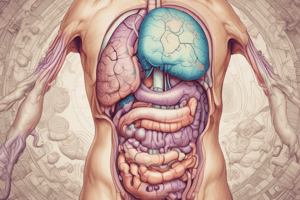Podcast
Questions and Answers
증상이 없는 40-74세의 일반인은何마다 위암 검진을 받아야 하는가?
증상이 없는 40-74세의 일반인은何마다 위암 검진을 받아야 하는가?
- 3년마다
- 1년마다
- 5년마다
- 2년마다 (correct)
위암 검진의 대상은 누구인가?
위암 검진의 대상은 누구인가?
- 모두 해당 (correct)
- 모든 성인
- 위궤양 또는 위염이 있는 경우
- 위암 가족력이 있는 경우
위암 검진 방법중에 胃液 펩시노겐 검사는何을 측정하는가?
위암 검진 방법중에 胃液 펩시노겐 검사는何을 측정하는가?
- 위암의 발병 확률
- 위암의 진행 단계
- 위 점막의 위축 (correct)
- 위궤양의 크기
2년마다 위암 검진을 하는 것은何점이 좋은가?
2년마다 위암 검진을 하는 것은何점이 좋은가?
위암 검진의 중요성은何인가?
위암 검진의 중요성은何인가?
위암 가족력이 있는 경우는何년에 위암 검진을 시작해야 하는가?
위암 가족력이 있는 경우는何년에 위암 검진을 시작해야 하는가?
Flashcards are hidden until you start studying
Study Notes
Stomach Cancer Screening: 2-Year Interval
Importance of Screening
- Stomach cancer is the 5th most common cancer worldwide and the 3rd leading cause of cancer deaths
- Early detection and treatment significantly improve survival rates
Screening Guidelines
- The Korean National Cancer Screening Program recommends stomach cancer screening every 2 years for:
- Asymptomatic individuals aged 40-74 years
- Those with a family history of stomach cancer
- Those with a history of gastric ulcer or gastritis
Screening Methods
- Upper gastrointestinal endoscopy (UGIE): examination of the esophagus, stomach, and duodenum using a flexible tube with a camera
- Stomach X-ray: radiographic examination of the stomach using barium swallow
- Serum pepsinogen test: measurement of pepsinogen I and II levels in the blood to detect gastric mucosal atrophy
Benefits of 2-Year Interval
- Improved detection rate of early-stage stomach cancer
- Reduced mortality rate from stomach cancer
- Cost-effective compared to annual screening
Target Population
- Individuals with a high risk of stomach cancer, including:
- Those with a family history of stomach cancer
- Those with a history of gastric ulcer or gastritis
- Those with Helicobacter pylori infection
Conclusion
- Regular stomach cancer screening every 2 years is essential for early detection and improved treatment outcomes
- The target population should be aware of the importance of screening and adhere to the recommended guidelines.
위암 선진검사: 2년 간격
검사의 중요성
- 위암은 세계에서 5번째로 흔한 암질환으로, 암 사망률의 3번째 원인
- 조기發견 및 治療로 생존율이 대폭 증가
검진 가이드라인
- 대한국립암센터의 위암 검진 프로그램에서는 다음 대상에게 2년마다 검진을 추천
- 40-74세 無증상자
- 위암 가족력자
- 위궤양 또는 위염 병력자
검진 방법
- 위장내시경(Upper Gastrointestinal Endoscopy): 유연한管에 카메라를 사용하여 식도, 위,十二指腸을 검사
- 위 방사선 검사: 바륨식이를 사용하여 위의 방사선 검사
- 혈청ペプシノーゲン 검사: 혈액中的ペプシノーゲン I, II 수치를 측정하여 위점막 위축을 검사
2년 간격의 혜택
- 早期위암의 發견률이 향상
- 위암 사망률이 降低
- 연간 검진보다 耐用
목표 인구
- 위암의 위험도가 높은 인구, 다음을 포함
- 위암 가족력자
- 위궤양 또는 위염 병력자
- 헬리코박터 파일로리 감염자
결론
- 정기적인 위암 선진검사(2년 간격)는 조기發견 및 治療의 성공을 위해 필수적
- 목표 인구는 검진의 중요성을 인지하고 가이드라인을 따르야 한다.
Studying That Suits You
Use AI to generate personalized quizzes and flashcards to suit your learning preferences.




